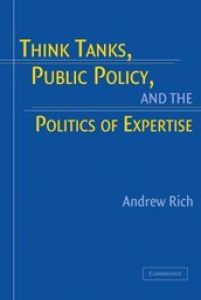Join getAbstract to access the summary!

Join getAbstract to access the summary!
Andrew Rich
Think Tanks, Public Policy, and the Politics of Expertise
Cambridge UP, 2004
What's inside?
Think tanks are known for their research, their general conservatism and their credibility - until they start taking checks.
Recommendation
If you study any complex issue being debated in the U.S. Congress or state legislatures, you are likely to find a torrent of reports from independent think tanks. Who are these groups and where did they come from? Good question - and one that political scientist Andrew Rich answers quite thoroughly. This often fascinating study shines its bright light on think tanks, largely overlooked players in the political process. At times, though, Rich’s study tantalizes with generalizations, and then it tends toward scholarly restraint at exactly the moment when the reader wants some juicy details. getAbstract suggests this book to anyone who wants to shape - or really understand - the public debate on complex policy issues.
Summary
About the Author
Andrew Rich is an assistant professor of political science at City College of New York. He holds a doctorate in political science from Yale University, and he taught at Wake Forest University from 1999 to 2003.

















Comment on this summary